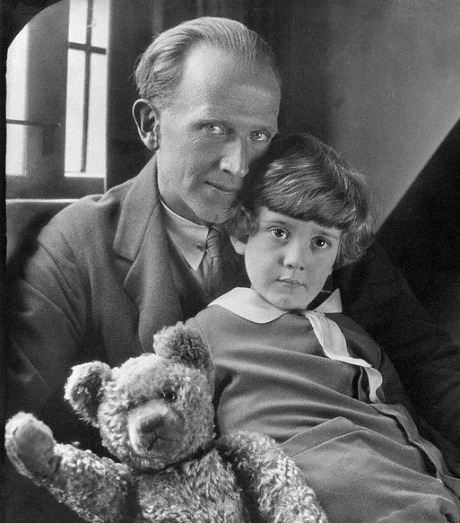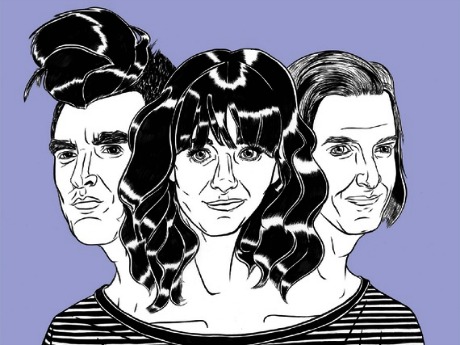Could there anything more “twee” than a gently emotional film about A.A. Milne, the creator of the “Winnie the Pooh” books? Especially with Milne being played by Domnhall Gleeson, one of the undisputed kings of Hollywood twee with his achingly sensitive manner, fucking carrot hair and watery blue eyes? When I read about Fox Searchlight’s Goodbye, Christopher Robin, which will costar Margot Robbie as Mrs. Milne, I went “aarggh!” Mrs. Tarzan and Jordan Belfort‘s insanely seductive gold-digging wife married to a dweeby English poet? In what universe will this film take place?

Winnie the Pooh author A.A. Milne and son Christopher Robin Milne, taken in the mid 1920s.
We’ll apparently be looking at another Finding Neverland (’04), in which Johnny Depp played another revered London-based author of a legendary children’s fable. Pic will be directed by Simon Curtis (Woman in Gold, My Week With Marilyn) with a script by Frank Cottrell Boyce and Simon Vaughn.
Is there any chance we’ll one day see a movie about Theodor Seuss Geisel, i.e, the creator of the Dr. Seuss books?
Will Curtis’s film acknowledge that Milne’s son, Christopher Robin Milne, who was the inspiration for the Christopher Robin character in the Pooh books, became more and more resentful of his father’s exploitation of his childhood and came to hate the books that had thrust him into the public eye?
From a 7.15.14 HE piece called “Twee Time”:
“The Twee Revolution,” a month-old Atlantic piece by Jonathan Parker, is a review of Mark Spitz‘s “Twee: The Gentle Revolution in Music, Books, Television, Fashion, and Film.” My favorite Parker passage:

“Is Twee the right word for it, for the strangely persistent modern sensibility that fructifies in the props departments of Wes Anderson movies, tapers into the waxed mustache-ends of young Brooklynites on bicycles, and detonates in a yeasty whiff every time someone pops open a microbrewed beer? Well, it is now.
“If [Spitz’s] book is a little all over the place—well, so is Twee. Spitz hails it as ‘the most powerful youth movement since Punk and Hip-Hop.’ He doesn’t even put an arguably in there, bless him.
“You’re Twee if you like artisanal hot sauce. You’re Twee if you hate bullies. Indeed, it’s Spitz’s contention that we’re all a bit Twee: the culture has turned. Twee’s core values include ‘a healthy suspicion of adulthood’; ‘a steadfast focus on our essential goodness’; ‘the cultivation of a passion project’ (T-shirt company, organic food truck); and ‘the utter dispensing with of cool as it’s conventionally known, often in favor of a kind of fetishization of the nerd, the geek, the dork, the virgin.”
In my mind “twee” is a summation or coming together of several Millenial expressions and creative touchstones, one of which is the musical variant that I once called “oodly-doodly,” and oodly-doodly comes from the same Millenial mentality as shoegaze and other curiously passive musical forms.
I’ve also described this kind of music as the product of “flutter” bands. In an 8.13.10 piece I described their music as “ethereal, dreamily feminine and generally unpunctuated…music that seems dead set against any kind of thump-crunchin’ sound or attitude [and] that seems to summon the candy-assed spirit and attitude of Michael Cera.”
To go by reviews and descriptions, Spitz’s book doesn’t appear to be about cultural lament or admonishings. Parker is saying “look at these twee twerps!” but Spitz isn’t. He’s saying “this is what’s happened…this is the shape and mood of things now, at least in the urban areas among the under-40s.”
